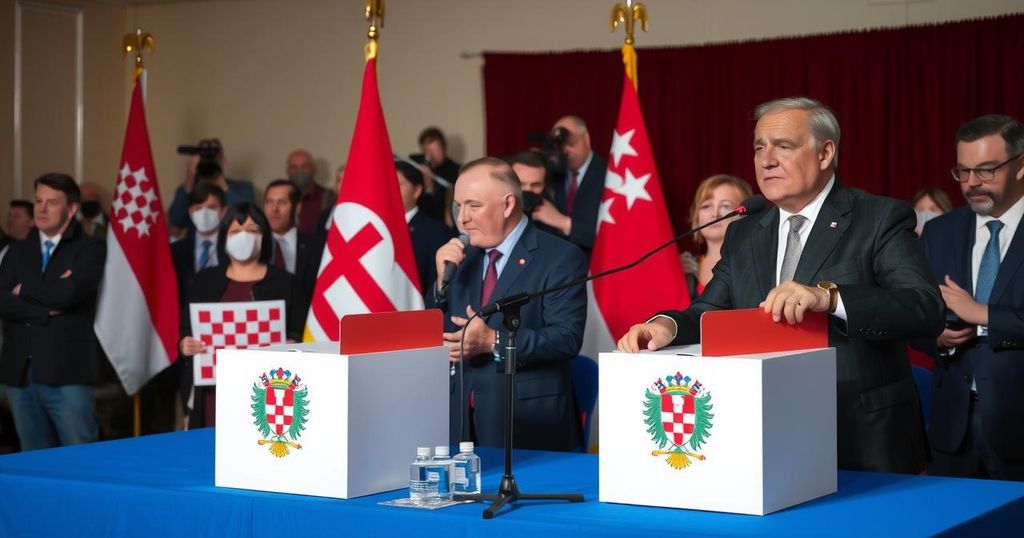Milanovic Poised for Re-election as Croatians Vote in Presidential Run-off

Zoran Milanovic is expected to win the Croatian presidential run-off election after receiving 49.1 percent of the vote in the first round. His main rival, HDZ-backed Dragan Primorac, secured 19.35 percent. The election occurs amidst significant national challenges, and Milanovic’s win would signify a setback for the ruling party, amid his contentious relationship with Prime Minister Plenkovic.
On Sunday, Zoran Milanovic, Croatia’s incumbent president and a vocal critic of NATO, is anticipated to secure a second term in the presidential run-off election. In the initial voting round two weeks prior, he received 49.1 percent of the votes, narrowly falling short of an outright victory. Contrastingly, his opponent Dragan Primorac, who received 19.35 percent of the votes, is backed by the ruling Croatian Democratic Union (HDZ) party, which has been in power since Croatia’s independence in 1991.
Polling stations across the nation opened at 7 AM local time and will remain operational until 7 PM. Early exit polls are expected to be released shortly after closing. The presidential election occurs amid significant challenges for Croatia, including high inflation, ongoing corruption scandals, and a labor shortage, which have created a politically charged atmosphere.
Milanovic, a former prime minister and leader from the left, assumed the presidency in 2020 with support from the opposition Social Democrats. While he has condemned Russia’s aggression towards Ukraine, he maintains an ambivalent stance towards Western military involvement in the conflict. His rival accuses him of being a “pro-Russian puppet.” The incumbent’s confrontational style of politics has drawn comparisons to former U.S. President Donald Trump.
The relationship between Milanovic and Prime Minister Andrej Plenkovic has been contentious, marked by accusations of corruption aimed at the HDZ party and its leader, which Milanovic claims pose a threat to Croatian democracy. While the presidential role in Croatia has limited executive power, it remains a critical position influencing the political climate in the country.
Dragan Primorac, a former education minister under the HDZ party, has primarily focused on academic pursuits since his initial unsuccessful presidential bid in 2009. During the election campaign, tensions escalated when Milanovic criticized Primorac for ties with figures he deems controversial. Milanovic’s steadfast position includes his refusal to endorse the deployment of Croatian soldiers in NATO missions concerning Ukraine, a stance disputed by the government.
Milanovic’s potential victory would represent a significant blow to the HDZ party and its leadership amidst Croatia’s evolving political landscape.
As Croatia approaches a pivotal presidential election, the incumbent Zoran Milanovic finds himself in a critical position to retain his seat. His initial success in the first voting round has raised the stakes for both himself and his opponent Dragan Primorac of the HDZ party. This election unfolds against a backdrop of economic difficulties and political strife, reflecting the complexities of governance in a young democracy. Milanovic’s controversial views on NATO and Ukraine further complicate the political dynamics, influencing public perception and voter sentiment.
In summary, Zoran Milanovic’s expected victory in the Croatian presidential runoff indicates a potential shift in the political landscape, particularly regarding the influence of the HDZ party. With significant challenges facing the nation, including inflation and corruption, the outcome of this election holds implications for Croatia’s future governance and foreign policy stances. Milanovic’s positioning as a challenger to the status quo resonates with many voters seeking change amid ongoing national struggles.
Original Source: www.aljazeera.com








